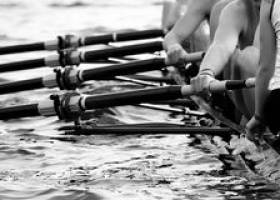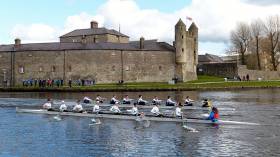Displaying items by tag: Erne Head of the River
Erne Head of the River Rowing Race 2024 Takes Place This Saturday
Waterways Ireland advises masters and owners of vessels on the Erne System in Northern Ireland that the Erne Eights Head of the River rowing race will take place this Saturday 2 March.
The event will start upstream of the Killyhevlin Hotel and will race through to Enniskillen Royal Boat Club.
Rowing boats and craft will be on the water from 9am to 5pm. There will be around 80 rowing crews participating in the event. The downstream sections of the Round ‘O’ jetty will be closed for the duration.
Masters of vessels should adhere to all instructions given by race marshals on the day and keep the race course clear, especially during racing.
Masters of vessels are also asked to keep wash to minimum when passing rowing crews and race marshals, the cross-border body for Ireland’s inland waterways says.
Erne Head of the River Rowing Race Takes Place This Saturday
Waterways Ireland advises masters and owners of vessels on the Erne System that the Erne Head of the River rowing race will take place this Saturday 4 March.
The event will start upstream of the Killyhevlin Hotel and will race through to Enniskillen Royal Boat Club.
Rowing boats and craft will be on the water from 9am to 4pm. There will be around 100 rowing crews participating in two events: the Women’s Eight at 11am and the Men’s Eight at 1.30pm.
Masters of vessels should adhere to all instructions given by race marshals on the day and keep the race course clear, especially during racing.
Masters of vessels are also asked to keep wash to minimum when passing rowing crews and race marshals, the cross-border body for Ireland’s inland waterways says.
Cork Head Postponed Until Sunday
#Rowing: The Cork Head of the River will be held this Sunday, March 3rd. The organisers decided to postpone the event by one day because of the adverse weather forecast for Saturday. The 4km event from Horgan’s Quay to Blackrock Castle will hold to the times set for Saturday.
The indications are that the Erne Head in Enniskillen will go ahead on Saturday.
60th Head of the River Brings More Than 600 Rowers to the Erne
The Erne Head of the River will welcome an exceptionally large entry of 91 boats and well over 600 rowers to Enniskillen on Saturday, March 4th. The race - the 60th - will be visible from the start point four miles downstream of Enniskillen Royal Grammar School (ERGS) Boat Club with the best views from the Killyhevlin Hotel, riverside in Cornagrade and the finish line at Portora boathouse itself.
Beginning at 1.15pm, each craft will start at a 30 second interval on a race to the finish line at Portora boathouse. Men, women's and junior teams of all ages and abilities will set off in turn in a race against the clock. The 90 boats will stream over the finish line from 1.45pm; for some, setting new records and for others getting to the finish line, the main achievement.
Twenty eight clubs are represented at the event from all over Ireland, including a new club based on the Erne. The Portora Boat Club has been created by old Portorans and parents of rowers from ERGS and other Fermanagh schools continuing the traditions of the old Portora Boat Club. It will challenge at the Head of the River for the first time in the men’s masters.
The event is an opportunity for clubs to gauge their progress during winter training against that of the competition. The number of entries is up 30 on last year reflecting a significant increase in rowing numbers in Northern Ireland and across Ireland.
Muckross Head of the River to be held in March
#Rowing: Muckross Rowing Club has chosen to reschedule its head of the river for March 5th. The original date was December 5th, but there was a poor weather forecast and the head had to be cancelled. The March 5th date will be shared with the Erne Head of the River in Enniskillen.






























































